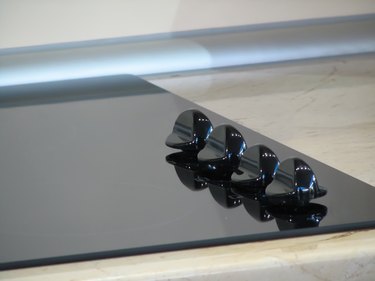Glass and ceramic stove tops, though shiny and appealing, require more careful use than coil tops. Dragging canning equipment and cast iron skillets over the cooktop can scratch the surface. In a worst-case scenario, you may damage the heating elements or break the stove top. Although some say it's OK to use cast iron on a glass-top stove, it's a risky venture.

Weight
Cast iron is heavy by itself. Fill that pot with water or soup, and you're putting a lot of weight on the glass cooktop. Even if the top can handle the weight, it can easily crack if you drop the cast iron pot while lifting it. Keep the weight in mind, including the pan itself and the contents, if you want to use cast iron on a glass cooktop.
Video of the Day
Video of the Day
Flat Bottoms
Pots and pans with flat bottoms are essential for even heat distribution on glass and ceramic stoves. Most cast iron cookware isn't perfectly flat. That means your pans don't sit flat and may take longer to heat. That slower heating process can increase the cooking time and cause uneven heating.
Size
The recommended pot size is no more than an inch larger than the burner. Many cast iron pots are much larger than the burners on your glass-top stove. If the pot is larger than the recommended size, the pan doesn't distribute heat evenly across its surface. The element cycles on and off, reducing the cooking speed and the life of the element. A large, heavy pot like cast iron traps heat under the cookware. This heat buildup shortens the life of the element or may damage the cooktop surface.
Finish
Cast iron has a rough finish that can scratch the surface of a glass cooktop. Cast iron coated in porcelain enamel is an option on a glass top. Make sure the finish is smooth and covers the cast iron completely to avoid scratches. If you use the enameled pan on a very high heat setting for a long period of time, the pan may hold onto the heat. This could cause the element to stop working if the temperature limiters sense that the top is too hot. Stainless steel is the metal of choice for ceramic or glass cooktops. Aluminum is usable but may leave gray marks on the surface.
Induction Cooktops
An induction stove also has a glass top, but it uses different technology to cook the food. Instead of a heating element beneath the glass that transfers heat into the pan, the induction cooktop uses magnetic fields to create heat inside the pan. The actual cooktop doesn't get hot. But you can only use pans that are magnetic on an induction cooktop. Cast iron is magnetic, so it works on an induction stove. You can still have the same issues with scratching unless you use porcelain enameled cast iron.